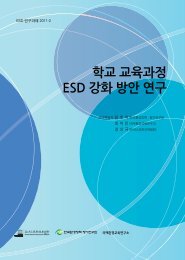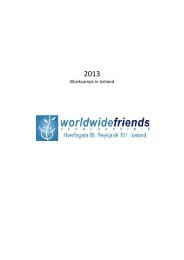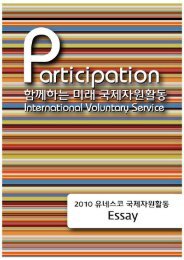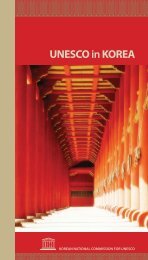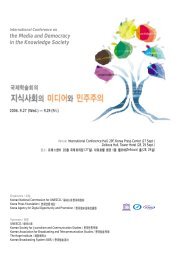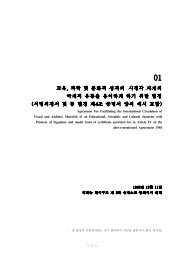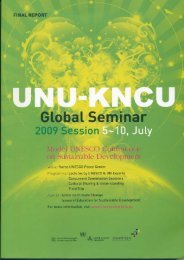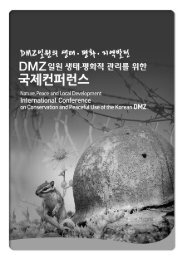íëìë³´ë2012문íì ë°ì ë¼ì´ëí ì´ë¸.pdf - ì ë¤ì¤ì½íêµììí
íëìë³´ë2012문íì ë°ì ë¼ì´ëí ì´ë¸.pdf - ì ë¤ì¤ì½íêµììí
íëìë³´ë2012문íì ë°ì ë¼ì´ëí ì´ë¸.pdf - ì ë¤ì¤ì½íêµììí
You also want an ePaper? Increase the reach of your titles
YUMPU automatically turns print PDFs into web optimized ePapers that Google loves.
There was also a question about the export and import of cultural expressions. We did<br />
publish an analysis of trade in cultural products and services few years ago. There are several<br />
expressions of cultural goods that do cross borders. So that is indeed possible. You can also<br />
think about the development in the sense of tourism. For instance, in Bhutan, tourism is the<br />
second largest export market. Tourism is basically grounded on their cultural expressions,<br />
their festivals, their religion symbols and others. There are several ways to export cultural<br />
products and sometimes consumers comes to your country … but anyway some kind of<br />
crossing borders is there.<br />
As for answer to why Korea is indicated as no training area in the map in my presentation,<br />
well, it is not that because we pick on Korea or don’t want to come here but somehow we<br />
have not been invited or there was no interest or whatever…<br />
Lynne Patchett<br />
Chief of Staff, UNESCO Culture Sector<br />
The first question picked up on the potential tension between emphasis on economic<br />
progress/development and culture, perhaps the incompatibility between the two. We cannot<br />
ignore that there is an economic side of culture but that is not the only one. We are looking at<br />
development at a broader sense. Our definition of culture set out in the 2001 UNESCO<br />
declaration of cultural diversity defines culture in a very broad sense. It’s something related<br />
to the heart of human identity, and as a means of enriching human existence, building social<br />
cohesion, respects, and promoting these values. That is the heart of various cultural<br />
conventions. We can’t ignore the economic part, and sometimes this is the aspect of the UN’s<br />
focus, but we have to keep the broad approach. For instance, UNESCO promotes this idea in<br />
initiatives such as ‘Dream Centers’, where young people in post-disaster/post-conflict<br />
countries are exposed to arts and express themselves (their emotions) through arts … I want<br />
to reassure that UNESCO promotes this broader definition of culture.<br />
Regarding the issue on culture and human rights, the 2001 declaration mentions very<br />
clearly that all cultures have something to contribute as long as it is compatible with universal<br />
values that UN advocates. UNESCO works at international level with other governments to<br />
promote human rights and to change attitudes. We also try to work at community levels,<br />
trying to develop alternatives, but I acknowledge that this is a very sensitive issue. We are not<br />
a funding agency per se, but we work with donor countries to provide financial and technical<br />
assistance.<br />
Considering the platform for cultural exchange, I think the UN is the platform, where



